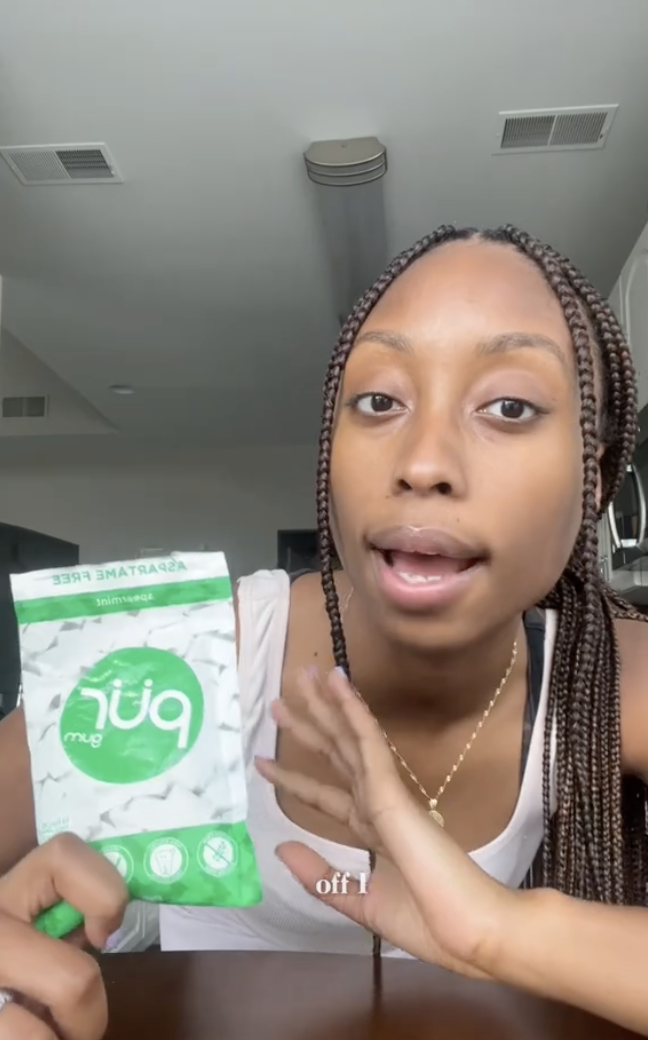If there's one thing you'll always find me doing, it's snacking. Whether it's the occasional random slice of cheese in the fridge, a handful of tortilla chips, or that random Trader Joe's find that caught my eye in the checkout line, there's usually a fun treat in my hand. So you can imagine my horror when I came across a now-viral video from Siena Filippi about the several cavities she obtained from "snacking."

In her video, with over two million views, Siena says her dentist broke the news that she apparently had "a starting cavity on almost every tooth" and cited snacking as a major cause. "He literally said one of the two major causes of cavities is girls who be snackin' a lot," she says.

Now, as a "girl who be snackin' a lot" (and one who probably doesn't go to the dentist as often as she should), I was appalled at this new information. So, I reached out to Dr. Zainab Mackie, DDS, a Michigan-based dentist, to find out how enjoying our favorite snacks can cause cavities and how we can hopefully prevent them.
"Every time we eat, the bacteria in our mouth consume the sugars in our diet and then release acids as part of their fermentation process. The released acid can cause breakdown or demineralization of the enamel of our teeth," Dr. Mackie told BuzzFeed. "So at this acidic level, we are more prone to getting cavities. Luckily, our saliva works to buffer the acids and get it back to normal each time we eat. However, if you are constantly snacking, especially on carbohydrates, then you are constantly creating an acidic cavity-causing environment in your mouth."

Essentially, constant snacking doesn't provide enough buffer time for the acid levels in our mouths to return to normal, causing more erosion and, therefore, more cavities. However, not all snacks are created equally, and Dr. Mackie warned that ones high in sugar, carbohydrates, and starches (think sticky fruit, chips, crackers, etc.) are more likely to cause cavities.
"Remember that carbohydrates are energy sources for bacteria. Better snack options would be low-carb choices like vegetables, nuts, cheese, and yogurt," she advised.
Since I was also curious about Siena's dentist's conclusion that she had "starting cavities" on almost every tooth from snacking, I asked Dr. Mackie what exactly a starting cavity is and if they're reversible. "A starting cavity is just a cavity that your dentist can detect in its early stages. We can detect it either radiographically or clinically by changes in the texture and color of the enamel surface," she told me.

Unfortunately, starting cavities can't be reversed, but there are measures you can take to prevent them from growing further. "For example, if the early cavity is in between the teeth, flossing and fluoride treatments can help stop it from growing any bigger," Dr. Mackie said.

In terms of preventing these cavities from forming in the first place, even if you are a heavy snacker, one suggestion caught my attention: xylitol gum. In a viral stitch to Siena's original TikTok, dietitian Shyla Cadogan, RD, LDN, reiterated Dr. Mackie's point that constant grazing "continuously creates and maintains this acidic environment in your mouth, making you more prone to cavities." Shyla's big piece of advice? Chew xylitol gum.

"After every meal or snack, I chew it for like five minutes," Shyla says in her video. She explains that xylitol is a "natural sugar alcohol that essentially just helps to regulate the acidity in your mouth." She goes on to say that this works because the xylitol "tricks the bacteria into thinking it's sugar, but then it eats it, and it realizes that it can't actually use it for energy, and then they die off."
If you're thinking of just grabbing any ol' gum to chew after indulging in a few snacks, not so fast. Shyla warns that sugar-laden gums can actually make things worse. "Sugar-laden gums don't benefit oral health; if anything, they can worsen cavity risk as sugar feeds the bacteria that promote cavity formation," she told BuzzFeed. Dr. Mackie agreed that sugar-free and xylitol gums are probably your best bet and added that the act of chewing gum, in general, can help oral health because it stimulates saliva production.

Besides xylitol gum, there are other preventative measures you can take if you're a snacker who wants to avoid cavities. Dr. Mackie recommends drinking water right away after each meal or snack. "Water washes debris off your teeth. It also helps to raise the pH of your mouth so that it's not acidic." Shyla reiterated this and emphasized the importance of flossing every day and brushing twice a day. In her video, she even mentions using an "expandable floss," which she says is "thicker" and "treats the teeth better."

Being more aware of when you're consuming meals, snacks, and drinks can also help your oral health. According to Dr. Mackie, "It takes 30-40 minutes for our saliva to bring the acid level in our mouth back to normal. If you eat again within that time frame, then your mouth will stay at an acidic level for a longer period, creating more of an opportunity for cavities to form."

All in all, Dr. Mackie says that being cavity-prone isn't due to just one thing like snacking. Your diet, oral hygiene, and even certain medications that may dry out your mouth can all play into effect. So don't worry, fellow grazers; we don't need to start cutting snacks out cold turkey.
You can follow Dr. Mackie on TikTok and Instagram for more dental advice and Shyla on TikTok for more dietician tips.
